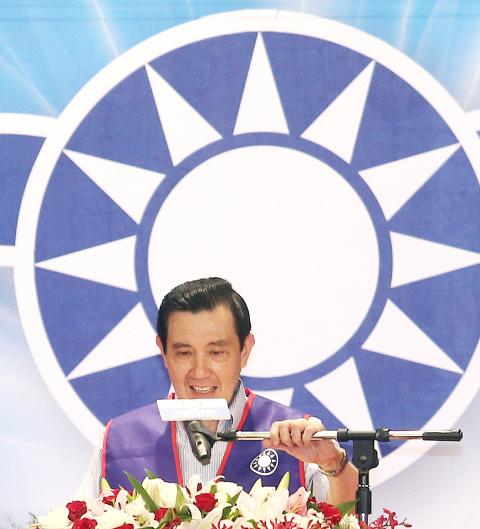The Cross-Strait Taiwanese Business People Chinese Nationalist Party (KMT) Fan Club celebrated its establishment in Taipei yesterday. President Ma Ying-jeou (馬英九), who was present at the event as KMT chairman, called on Taiwanese businesspeople working in China to support the KMT, which he said is “on the right side of history.”
Top echelons from the party and KMT candidates attended the celebration, organized by Taiwanese working in China to rally votes and encourage businesspeople to return to participate in the Nov. 29 9-in-1 elections.
KMT vice-chairpersons Wu Den-yih (吳敦義), Tseng Yung-chuan (曾永權) and Hung Hsiu-chu (洪秀柱), KMT Central Review Committee Chairmen Lin Join-sane (林中森) and Chiang Pin-kung (江丙坤) — who are respectively the current Straits Exchange Foundation chairman and the former chairman — KMT Taipei mayoral candidate Sean Lien (連勝文) and Taoyuan County Commissioner John Wu (吳志揚) were present at the event alongside business representatives from the nation’s 22 cities and counties.

Photo: CNA
The founding of a KMT fan club among Taiwanese businesspeople working in China for local elections rather than a national election has no precedent.
The reason might have been hinted at by Ma’s speech at the event, in which he said that in some regions: “We are having a close [election] fight.”
“The KMT is on the right side of history and on the side consistent with the needs of the people,” Ma said, highlighting that the party won the 2008 and 2012 presidential elections with the support of Taiwanese businesspeople and that they could again play a key role this year.
Ma reiterated his view that the suspicion that former Mainland Affairs Council deputy minister Chang Hsien-yao’s (張顯耀) leaked state secrets was only “a small ripple in the strong wave of cross-strait developments.”
Ma also championed his efforts in improving cross-strait relations, emphasizing that the student-led Sunflower movement might have hindered the progress of the cross-strait service trade agreement, but did not prevent China’s Taiwan Affairs Office director Zhang Zhijun (張志軍) from visiting Taiwan.
Berating opposition parties for having what he termed “knee-jerk protests” whenever encountering China, Association of Taiwan Investment Enterprises on the Mainland chairman Kuo Shan-hui (郭山輝) said the service pact “must be passed regardless of its flaws,” as the pact is for the overall “uplift and cannot be opposed for a few blemishes or simply for the sake of opposition.”
Kuo said the 138 associations of Taiwanese businesspeople in China would make lists of names to guide the mobilization of potential voters.
The associations are also to help potential voters obtain group discounts for airplane tickets in order to encourage their return for the election, he added.

MAKING WAVES: China’s maritime militia could become a nontraditional threat in war, clogging up shipping lanes to prevent US or Japanese intervention, a report said About 1,900 Chinese ships flying flags of convenience and fishing vessels that participated in China’s military exercises around Taiwan last month and in January last year have been listed for monitoring, Coast Guard Administration (CGA) Deputy Director-General Hsieh Ching-chin (謝慶欽) said yesterday. Following amendments to the Commercial Port Act (商港法) and the Law of Ships (船舶法) last month, the CGA can designate possible berthing areas or deny ports of call for vessels suspected of loitering around areas where undersea cables can be accessed, Oceans Affairs Council Minister Kuan Bi-ling (管碧玲) said. The list of suspected ships, originally 300, had risen to about

DAREDEVIL: Honnold said it had always been a dream of his to climb Taipei 101, while a Netflix producer said the skyscraper was ‘a real icon of this country’ US climber Alex Honnold yesterday took on Taiwan’s tallest building, becoming the first person to scale Taipei 101 without a rope, harness or safety net. Hundreds of spectators gathered at the base of the 101-story skyscraper to watch Honnold, 40, embark on his daredevil feat, which was also broadcast live on Netflix. Dressed in a red T-shirt and yellow custom-made climbing shoes, Honnold swiftly moved up the southeast face of the glass and steel building. At one point, he stepped onto a platform midway up to wave down at fans and onlookers who were taking photos. People watching from inside

Japan’s strategic alliance with the US would collapse if Tokyo were to turn away from a conflict in Taiwan, Japanese Prime Minister Sanae Takaichi said yesterday, but distanced herself from previous comments that suggested a possible military response in such an event. Takaichi expressed her latest views on a nationally broadcast TV program late on Monday, where an opposition party leader criticized her for igniting tensions with China with the earlier remarks. Ties between Japan and China have sunk to the worst level in years after Takaichi said in November that a hypothetical Chinese attack on Taiwan could bring about a Japanese

The WHO ignored early COVID-19 warnings from Taiwan, US Deputy Secretary of Health and Human Services Jim O’Neill said on Friday, as part of justification for Washington withdrawing from the global health body. US Secretary of State Marco Rubio on Thursday said that the US was pulling out of the UN agency, as it failed to fulfill its responsibilities during the COVID-19 pandemic. The WHO “ignored early COVID warnings from Taiwan in 2019 by pretending Taiwan did not exist, O’Neill wrote on X on Friday, Taiwan time. “It ignored rigorous science and promoted lockdowns.” The US will “continue international coordination on infectious